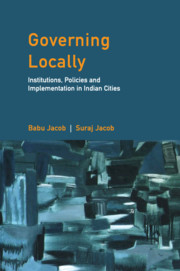4 - Organising City Governments
Published online by Cambridge University Press: 06 August 2021
Summary
City governments are aggregates of diverse people in diverse roles. How do they and their roles relate to each other? And (how) do they come together to function as an effective whole? Is there a sense of common purpose for the public good, for creating effective and just services? These become critical questions for organisational efficacy. This chapter explores job descriptions, job qualifications, reporting relationships, internal monitoring and supervision, feedback loops, internal incentives and disincentives – and how all these, put together, create city government ‘output’. Careful, thick descriptions of this whole will help to explore whether organisational structure and staffing are appropriate and effective.
In India's city governments, a permanent bureaucracy drives affairs but its composition and management differ considerably across states. Bureaucrats are permanently affiliated to specific city governments in Gujarat and Tamil Nadu.1 In Kerala, they belong to common state cadres recruited and controlled directly by the state government. Previously, their organisational forms were antiquated: heavily hierarchical, horizontally narrow and not nimble enough to respond to new functional needs. The 1990s reforms made restructuring crucial because they added large, new tasks to the policy responsibilities of city governments. But Kerala city governments did not restructure their organisations. Gujarat city governments already had relatively ‘delayered’ and ‘deconcentrated’ organisations and could respond to new opportunities such as the Jawaharlal Nehru National Urban Renewal Mission (JNNURM).
The first section of this chapter explores the organisational structure, ‘the sum total of the way in which an organization divides its labor into distinct tasks and then coordinates them’ (Hodge, Anthony and Gales 1996, 32). The focus is on how a city government is organised by differentiating functions across departments and vertical hierarchies. The second section discusses issues of staffing: recruitment, specialisation, monitoring, motivation, promotion, and so on. The following section details reporting relationships, policy networks, staff shortages and unfilled vacancies. We then explore the impact of state–local relations on the organisation and staffing of a city government as a prelude to a fuller exploration of state–local relations in Chapter 5. The last section presents vignettes from Kerala to show that despite the tight hold of the state government, even smaller city governments have many capable elected representatives and bureaucrats with a deep understanding of local issues, challenges and solutions.
- Type
- Chapter
- Information
- Governing LocallyInstitutions, Policies and Implementation in Indian Cities, pp. 107 - 138Publisher: Cambridge University PressPrint publication year: 2021



